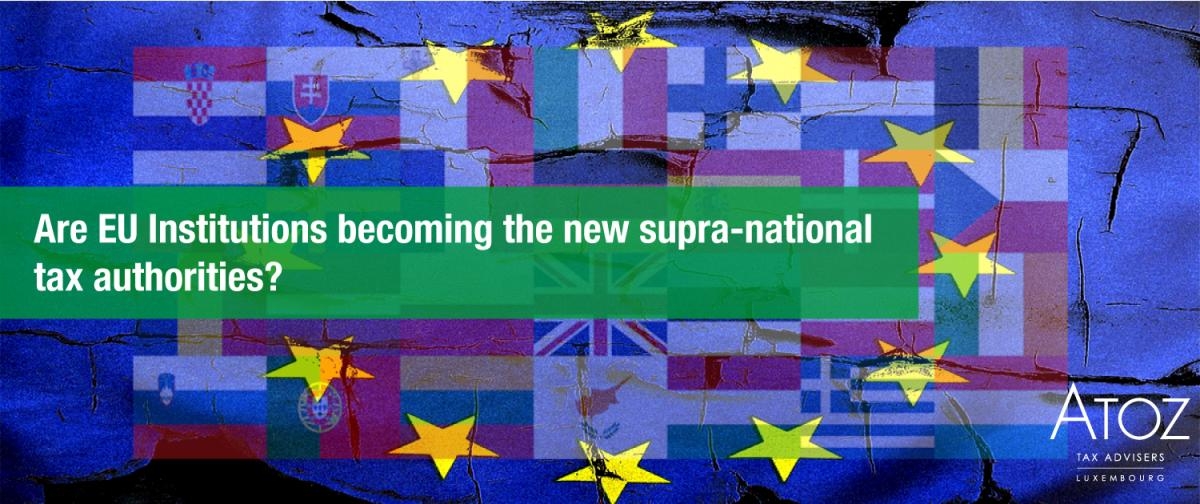Are EU Institutions becoming the new supra-national tax authorities? PART II – Who’s got the powers?
As we saw in Part I of this series, we have to ask ourselves the right questions. Namely, “are EU institutions overstepping the legal bounds?” In this Part II, we explore the increasing tax powers of the EU institutions and possible implications of the CCTB Proposal on Member States who actually don’t have much in common.
A coordinated delegation of tax powers
The European treaties do not give the EU Institutions a general tax regulatory power, but rather enable them to adopt measures to facilitate the establishment and functioning of the internal market. However, some elements, such as the delegated powers granted to the EU Commission under the supervision of the EU Council under the article 290 of the TFEU, witness the increasingly supra-national tax authority of EU Institutions. This provision states that the EU Commission may be conferred the power to adopt non-legislative acts of general application to supplement or amend certain non-essential elements of a legislative act. On this basis, the CCTB Proposal establishes powers for the EU Commission to act in a broad range of areas (notably to lay down definitions of more concepts, more detailed rules against tax avoidance). On the same ground, the EC tax intermediaries proposal dated 21 June 2017 empowers the EU Commission to update the list of hallmarks used to define the “potentially aggressive cross-border tax planning arrangements”.
These delegated powers are so broad that they give the EU Commission the ability to amend the scope of the relevant Directives and to close legislative gaps for an indeterminate period of time. De facto, the EU Commission is becoming a brand new EU tax authority. The only control over such delegate acts is a 2 month “stay of execution” within which the EU council would have to react (which is very difficult to imagine in practice).
These 2 Directive proposals are not the only area where the EU institution would act as supra-national tax authority. When it comes to State aid in tax matters, the EU Commission can choose, with the discretion of a tax authority, which cases to prosecute. This has been demonstrated again this 26 October 2017, when the EU Commission announced that, despite the fact that the Brexit negotiations are pending, it has opened an in-depth investigation into the UK Controlled Foreign Companies (“CFC”) rules. According to the EU Commission, the exclusion from the application of UK CFC rules for certain transactions by multinational groups, introduced as from 2013, allows these multinationals to pay less UK tax, and as a consequence be in breach of EU State aid rules. This is surprising when we know that, on one hand, such UK CFC exclusion is nevertheless denied where a main purpose of the funding structuring is to achieve a reduction in taxable UK loan relationships, and that, on the other hand, all EU MS are expected to introduce (or amend) CFC rules in their legislation as of 1 January 2019, following the adoption of Anti-Tax Avoidance Directive. While the CFC mechanism is complex, it is fairly apparent that what the commission is challenging (as often recently) is tax competition among MS, rather than any distortion of competition among businesses which is the proper purpose of the State aid rules.
The legitimacy issue
By proposing the CCTB Proposal, and by putting pressure on MS to accept, the EU institutions (pushed by “big” MS with a rather high tax pressure) seem to be trying to remove fiscal autonomy from the MS even further and assume a role of supra-national tax authority. A recent statement from the French Ministry of the Economy and Finances and the Minister of Public Accounts and Action, dated 7 August 2017, illustrates this. According to this statement, priority will be given to tax harmonization at the level of the European Union in order to eliminate variations of national legislations which allow tax evasion, and to end tax competition between MS. This declaration also states that France and Germany launched an initiative on 13 July 2017 to establish a common position aimed at the adoption of a first Directive by 2018.
This would have serious implications from a democratic legitimacy perspective. We are witness to a breakdown in the ability of MS to exercise their fiscal powers autonomously and, as a result, an erosion of the power of the citizens to control, through national parliaments, the management of these powers. In this scenario, it is ultimately the citizens who are losing their power to determine and control the orientation of their States’ fiscal policies. Ultimately, why should “big” MS, as France and Germany, impose their views and tax policies on smaller MS? A more serious question is whether seeking to do this under the cover of completion of the internal market amounts to an abuse of process.
In this context, it is interesting to note that EU MS with low corporate tax rates (i.e. Cyprus with 12,5%, Ireland with 12.5%, Bulgaria with 10%, Hungary with 9%; Latvia with 15%) meet the EU budgetary deficit requirement (deficit below the 3% of GDP Treaty reference value) while some EU MS with a higher tax rate (i.e France with 33%, Greece with 29%) struggle to meet the EU requirements in this area and are subject to Excessive Deficit Procedures (EDP). Similarly, Sweden and Estonia, with corporate tax rates of 22% and 20 % respectively, have never breached their obligation in terms of EU budgetary limits. These facts, added to the tendency of many MS to engage in a move to a lower rate close to 20% are difficult to reconcile with the political proposal made in the EU parliament to impose a common corporate tax rate of 25%.
One size fits no one
Is the CCTB proposal the first step of a new EU fiscal capacity, notably through the powers delegated by the Proposal to the EU Commission, under the supervision of the EU Parliament, linking monetary and fiscal policy? If this is the case, the road to full EU tax integration will not be an easy one… The fact that, in the recent Apple case, the Irish government is contesting the Commission’s decision concerning the recovery of €13 billion of illegal State aid granted by Ireland, unwilling to recover such amount for fear of losing its tax favorable status in the eyes of multinational corporations, clearly demonstrates that MS are not yet ready to waive their fiscal sovereignty rights and hand over control of their taxation powers to EU institutions. The MS' toolbox is shrinking. As monetary policy instruments are no longer available to help achieve macroeconomic objectives for Eurozone members, MS depend on fiscal policy to attract investments. To deny use of these remaining tools would be to deny the right of States and citizens to build their own, sovereign future. From a macroeconomic perspective, MS with low tax pressure on business have no reason to be envious of MS, like France, with higher tax pressure.
There is no “one size fits all” approach when it comes to tax law. Every EU MS has a different economy with different needs. A tax system responds to these needs, setting incentives or disincentives where appropriate. It is evident that a small open economy like Luxembourg has different requirements than a large economy like France and Germany. Similarly, they may have a different focus, depending on whether they are production based (like Germany) or service based (like Luxembourg). In this respect, legislators will generally choose a tax framework, including in calculation of the tax base, that encourage their countries’ economic growth. The CCTB also sets new incentives for optimisation, meaning that the status quo will not continue. Taxpayers will respond to these new incentives, out of the realm of control for the MS.
Last but not least, it might be worth pointing out that tax competition is not necessarily a bad thing. When tax competition is removed or greatly diminished, politicians are less inclined to foster a competitive environment..., are we thus risking the emergence of an tax cartel where larger less efficient MS seek to squeeze out smaller more efficient competitors?
Part III – Are we witnessing the emergence of an EU tax cartel? - coming soon.
Posted on 22/11/2017

